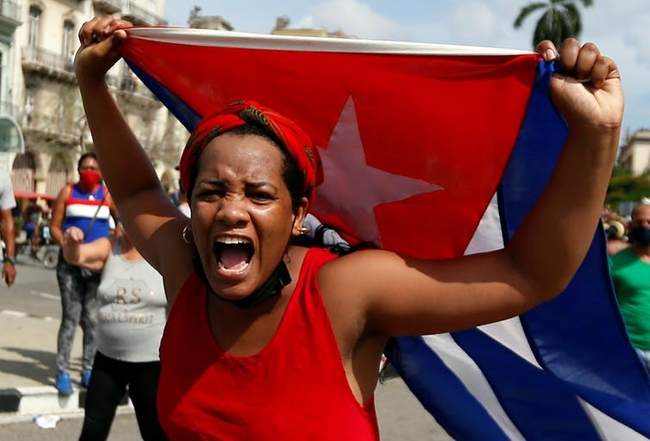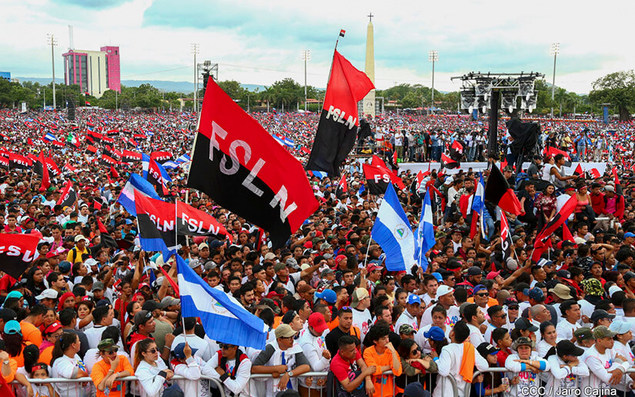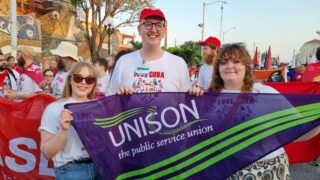UNISON will be the voice of the Global South at the upcoming Cop26 talks in Glasgow, Eastern region’s international seminar heard today.
After a predictably bumpy start with the technology, UNISON international officer Nick Crook opened the online seminar with an overview of the union’s priorities in the international arena, pointing out that global inequalities in the Covid-19 vaccine roll-out meant many those most affected by climate change would be unable to attend the conference.
“Civil society in the Global South will be unable to travel to Glasgow for Cop26 because of vaccine inequality,” he said. “Their voices will be lost. We have to be the voice of the Global South.”
Nick gave an overview of UNISON international’s main priorities.
The first was solidarity with Palestine, where Nick explained that the continued occupation and illegal settlements was making the “reality of a two-state solution look increasingly remote.”
He pointed to Colombia and Brazil, where trade unionists, environmentalists and other human rights activists are still being brutally repressed by their governments. In both places there are real hopes of a progressive breakthrough in elections next year that could see far-right presidents turfed out.
Thirdly, Turkey remains one of the union’s top priorities, Nick said. The Erdogan government continues to persecute trade unionists, particularly in the public sector, and has waged a virtual war on the Kurdish community and its political party the HDP.
Business and human rights work is the fourth priority, said Nick, shining a light on how abuses in the supply chain can be pervasive. The vast majority of the world’s rubber gloves, for instance, are made in Malaysia often under “appalling” conditions, where migrants have to work under forced servitude, slavery.
“Many of you will be wearing rubber gloves made by forced labour on a daily basis. It’s important these abuses stop,” he said.

A pro-government protester in Cuba
Cuba
After Nick, the meeting heard from some of the solidarity organisations that UNISON supports.
Rob Miller, director of the Cuba Solidarity Campaign, gave activists an insight into what was behind the recent protests on the socialist island, heavily covered by the British press.
He explained that Cuba was in the centre of a “perfect storm” related to the blockade, Covid-19’s overwhelming of the health service (“Cubans are not used to their health service being overwhelmed”), the collapse of tourism during the pandemic and subsequent shortages of food.
There were much larger pro-government protests after the initial demonstrations, but ministers still took the concerns seriously, with President Miguel Diaz-Canel going down to hear protesters’ grievances.
Nonetheless, Rob was clear that the protests were “co-ordinated and amplified by international campaign against Cuba,” taking advantage of genuine concerns.
An #SOSCuba campaign, largely used by anonymous Twitter bots, saw many calling for “humanitarian intervention,” a byword for invasion, with the mayor of Miami openly calling for air strikes, Rob said.
The situation underlines that “solidarity is more important than ever,” he said.
Colombia
Justice for Colombia’s Nick MacWilliam provided an update on the world’s most deadly place to be a trade unionist.
He pointed out that in the latest International Trade Union Confederation report Colombia once again tops the table for murders of trade unionists, as it has done every year since 1971 when records began. There were 22 last year.
And the country now tops another murder list, Nick said, with more environmental activists killed than anywhere else in the world. Sixty-six died last year, more than twice that of second-placed Mexico (30).
“But the Colombian government does basically nothing to address the situation,” Nick reported.
Nonetheless, trade unionists have led mass protests over the last two years against the effects of the country’s economic model and mishandling of the pandemic.
The government response was extreme violence. “Police opened fire indiscriminately, purposefully targeted protesters’ eyes to blind them,” he said. “You can only imagine the international outrage if this had happened in Cuba, but Colombia’s government is so aligned to British corporate interests there is virtually no coverage.”

Nicaragua
Attendees then crossed Latin America to hear from Nicaragua Solidarity Campaign Group’s Louise Richards.
The country is still scarred by the Contra war, when US backed militias successfully brought down the elected left-wing Sandinista government in the 1980s, ushering in a decade and a half of neoliberalism.
Since returning to government in 2016, the Sandinistas have reversed the privatisation of health and education, helping halve maternal mortality rates and poverty and eliminating illiteracy.
But Trump and Biden have continued traditional US hostility to popular sovereignty. Trump called Nicaragua “an unusual and extraordinary threat to the national security and foreign policy of the United States” – using exactly the same phrase as Ronald Reagan in the ’80s.
And leaked reports show the US is planning a coup ahead of elections this November, including plans to discredit the election process.
Louise warned that “corporate media, especially the Guardian and BBC are filled with misinformation” about the country, encouraging attendees to read the Morning Star or sign up to NSCAG’s mailing list for news about the country.
Eswatini/Swaziland
UNISON international officer Mark Beacon rounded off the first session by looking at southern Africa.
Some of the most interesting developments are in the tiny country of Eswatini, known until recently as Swaziland, where the region’s last absolute monarch maintains a tight stranglehold on the state.
Political parties are banned and the main opposition organisation PODEMO has been declared terrorist.
But democracy protests have erupted over the last couple of years, particularly in the countryside, normally tightly controlled by royally appointed chiefs, who can determine who’s allowed to live in an area.
When Swazis tried to present petitions of their grievances, the king banned handing over petitions.
Dozens have been killed by security forces cracking down on the protests and troops have gone door to door looking for activists.
When Southern African fact finders went in they were only allowed to speak to carefully vetted people.
Mark said it’s been very difficult to get Swaziland on the agenda and our government hasn’t paid attention. He encouraged MPs to ask questions and put pressure on the king.

